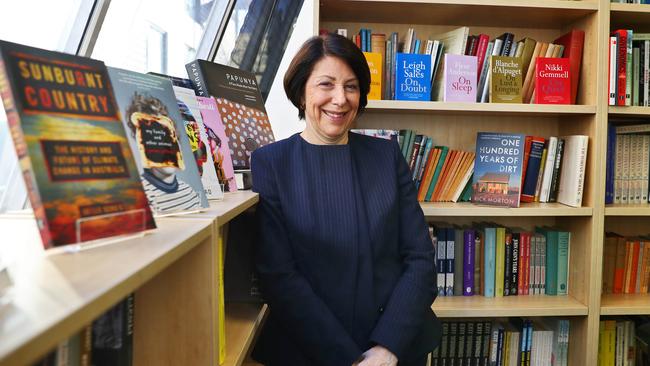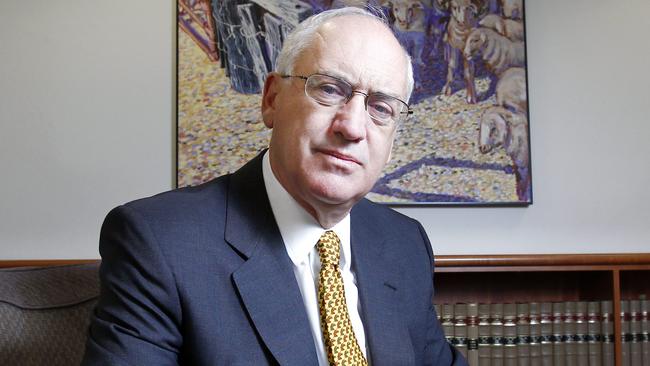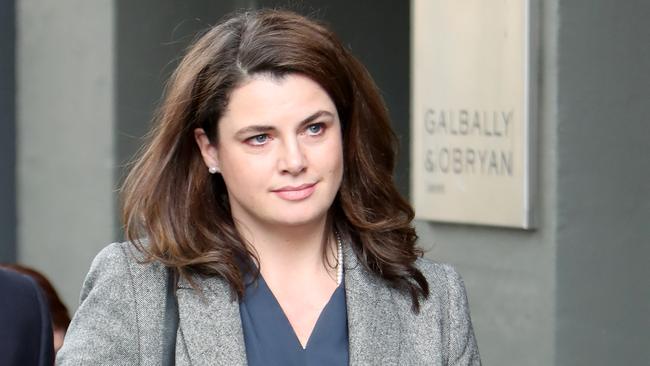Cardinal Pell, the silk and the publisher: it’s a real page-turner
A book containing allegations of child sex abuse against George Pell led to a rift between its publisher and Melbourne University.

A book containing allegations of child sex abuse against Cardinal George Pell led the University of Melbourne to review the publishing priorities of its wholly owned subsidiary, Melbourne University Publishing, and open a potentially damaging rift between two of Australia’s most important cultural institutions.
The Weekend Australian can reveal that University of Melbourne chancellor Allan Myers QC, Cardinal Pell’s counsel during the royal commission into institutional child sex abuse, privately savaged MUP’s decision to publish the book in a meeting with MUP chairman Peter McPhee. It is understood Mr Myers argued that Cardinal: The Rise and Fall of George Pell by ABC journalist Louise Milligan was not a good enough book to be published by MUP. Mr Myers criticised a number of other publishing decisions and urged MUP to focus on more scholarly works.
After Mr Myers raised his concerns, Mr McPhee and Louise Adler, the MUP publisher and chief executive who commissioned the Pell book, were called before the University Council and questioned about the finances and editorial priorities of the century-old publishing house.
That meeting resulted in the University Council, which is chaired by Mr Myers, conducting an extensive, four-month review of MUP’s financial health and publishing strategy. The review gave the company a clean bill of financial health, but recommended it consider ways of shifting the balance of its publishing to include more academic works.
The recommendation, if implemented, would represent a small victory for Mr Myers in what is shaping as a page-turning tussle between Ms Adler, MUP’s impeccably connected publisher, and one of Australia’s richest and most influential lawyers, pastoralists, philanthropists and lay Catholics.

Cardinal Pell is currently facing prosecution for historic child sex offences in the County Court of Victoria. Milligan’s award-winning book is one of MUP’s best-selling titles despite being withdrawn from Victorian bookstores for legal reasons.
Melbourne University vice-principal Adrian Collette said the review examined both the publishing purpose and future direction of MUP, a university press which publishes two trade books — mostly memoirs, biographies and other non-fiction books written by politicians, journalists and public figures — for every academic monograph it produces.
Mr Collette said the central question vexing the University Council — whether MUP should dedicate more resources to its core responsibility to publish academic works and fewer to less scholarly books which reach a broader audience and make money — was an “age-old dilemma’’ within university publishers.
MUP last year received an annual grant of $1.25 million from the university and a further $490,000 endowment to subsidise high-quality titles of national significance. The company recorded one of its best trading results, turning the previous year’s loss into a profit and finishing the year with $1.2m in the bank.
“MUP is a university subsidised publishing company,’’ Mr Collette said. “How it represents not just Melbourne University scholars but scholarship, and also promotes a broader community discussion, will be a live tension in the business all the time.
“One of the things the review has come back and said to us is there could be an opportunity for greater scholarly publishing given it is a university press.’’
Mr Collette said whatever the changes, MUP would retain its editorial independence. “There has been too much equity built up in MUP to ever consider doing anything to damage it,’’ he said.
Mr McPhee has left MUP and declined to comment. Laurie Muller, who took over as MUP interim chairman at the start of this year, said the push by the University Council for more academic publishing was “unexpected’’.
“You get a normal range of views rattling around within a university and the community as to whether MUP is publishing the right books,’’ he said. “Everyone is an expert. Louise is an energetic and engaged publisher. When you publish a lot of political books you make friends and enemies, and I think that has happened a lot with MUP.’’

The University of Melbourne last reviewed MUP in 2012 after the global financial crisis punched a hole in its financial position. This time, the review was prompted by a crisis of another kind. “The chancellor was very hostile towards the book,’’ an insider said. “We just had to deal with that. It wasn’t the only book that he felt MUP shouldn’t be involved in publishing, but he certainly was particularly displeased that it had been published.’’
News of Mr Myers’s response to the publication of Cardinal and dispute with Ms Adler has reached the highest levels of the Liberal Party, the Catholic Church in Australia and the publishing and business communities. Mr Myers declined to respond to questions from The Weekend Australian.
Cardinal is the most controversial book published by MUP since it commissioned an autobiography of underworld figure Mick Gatto. Another MUP book, Killer Instinct by forensic psychiatrist Donald Grant, was last month referred to Queensland’s Crime and Corruption Commission after families of murder victims profiled in the book accused the publisher of disclosing details about their loved ones they had not been told.
Ms Adler defended her author and the book on the grounds that the details in question were a matter of public record. She declined to remove the book from sale.
It is unsurprising that Mr Myers, a supporter of Cardinal Pell and a member of the Sovereign Military Order of Malta, an ancient lay Catholic order which the cardinal serves as honorary chaplain, took issue with the Pell book. Despite it winning a string of prizes, the book was attacked by some critics, including prominent defenders of Cardinal Pell, for being emotively written, lacking in balance and containing errors of fact. Yet, while opinions vary about any book, Mr Myers’ opinion carries substantial weight. Since January 2017, when the commercial silk was appointed chancellor of Melbourne University, he became the chair of the University Council, the governing body to which MUP reports.
Ms Adler, MUP publisher since 2003, is appointed by her company’s board, which includes three university representatives. Ms Adler’s contract as chief executive was last year extended through to 2022.

Mr Myers has amassed a personal wealth most recently estimated at $749m, much of it from an investment in Poland’s largest brewery as communism was collapsing in eastern Europe. He owns more than 10,000ha around his hometown of Dunkeld, which stretch deep into the Diocese of Ballarat where Cardinal Pell was born and served as a priest.
Mr Myers is a generous donor to Monivae College, the Catholic school he attended in the Western District town of Hamilton, to Melbourne University where he studied and taught law, and to the Liberal Party. He is also careful to ensure the money he donates is well spent. Mr Myers donated $51,000 and $29,000 to the Liberal Party in the 2010 and 2013 elections years, but his name is conspicuously absent from the Australian Electoral Commission returns for 2016-17, the financial year the Turnbull government went to the polls. Liberal Party sources told The Weekend Australian Mr Myers was furious at the changes to superannuation arrangements proposed by then assistant treasurer Kelly O’Dwyer.
More recently, Mr Myers represented the Cormack Foundation in its protracted dispute with the Liberal Party. People familiar with the legal saga said Mr Myers was simply hired first by the Cormack chairman, former ANZ boss Charles Goode. Mr Myers is one of the highest paid QCs in the nation and the counsel of first choice for billionaires, with Andrew Forrest, Gina Rinehart and Alan Bond all former clients.
As the son of a Dunkeld butcher more comfortable in the front bar of his country pub than seated in its critically acclaimed restaurant, Mr Myers has little time for the affectations of the literary set. In Ms Adler, a formidable publisher who counts former prime minister Tony Abbott and possibly our next one, Bill Shorten, among her authors, he has found a worthy match.
Ms Adler, the daughter of Jewish immigrants, brims with purpose and chutzpah. Raised as a cultural outsider, she regularly does business at the ever-so-Melbourne The European, a coffee house favoured by the city’s political, business and cultural elite. For three years she chaired the fiction and poetry panel of Australia’s richest writing prize, the Prime Minister’s Literary Awards.
She can be a tenacious adversary; witness the campaign she waged, as board chairman of the Methodist Ladies College, to remove a popular, long-serving principal after financial irregularities were uncovered. Even her sharpest critics concede that as publisher of MUP she has become a substantial figure in Australian literary and cultural life.
Ms Adler, when asked about Mr Myers’ criticism about Cardinal, said differences of opinions about books reflected a healthy literary culture and book industry. She defended the decision to publish the book and said the question of whether MUP should publish more scholarly titles and fewer trade books misunderstood modern publishing.
“All good publishers seek writers and ideas from a range of sources,’’ said. “Many academic writers seek to communicate scholarship to their peers, others seek to write for a broader audience. MUP is ideally placed to commercialise the research of academics, share it with both general readers or circulate it within specific disciplines.
“The financial support MUP receives from the university supports the publication of specialised content that would otherwise not be disseminated. The general titles we publish, including titles that originate from within the academy, ensure MUP is profitable.
“Our mandate is to publish books that matter from within the academy and beyond that reflect intensive research, editorial rigour and superior production values. The publishing program is shaped by MUP’s profile as an independent and courageous publisher.’’
Asked whether Mr Myers had confidence in MUP and her as chief executive, Ms Adler replied: “That is a matter for Mr Myers.’’
For now, the changes to MUP being pushed by the University Council are modest. The review recommended the adoption of an “open access’’ model which would enable MUP to publish online research papers, books and other academic works without copyright restrictions or royalty payments to authors. Discussions are continuing within the University Council about whether the model is suitable for MUP. Few people expect the story to end there.
Chip Le Grand is the author of The Straight Dope, published by MUP.


